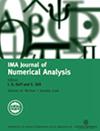基于不连续伽辽金时间离散的波动方程的唯一延拓
IF 2.4
2区 数学
Q1 MATHEMATICS, APPLIED
引用次数: 0
摘要
我们考虑到目前为止用相当复杂的时空方法离散的波动方程的稳定唯一延拓问题。在这里,我们提出用一个标准的不连续伽辽金方法来解决这个问题。在几何控制条件下建立误差估计。我们还研究了两种预处理策略,这两种策略可以通过简单的时间步进程序来解决产生的全局耦合时空系统。我们的数值实验测试了这些策略的性能,并强调了几何控制条件对于重建数据域之外的解的重要性。本文章由计算机程序翻译,如有差异,请以英文原文为准。
Unique continuation for the wave equation based on a discontinuous Galerkin time discretization
We consider a stable unique continuation problem for the wave equation that has been discretized so far using fairly sophisticated space-time methods. Here, we propose to solve this problem using a standard discontinuous Galerkin method for the temporal discretization. Error estimates are established under a geometric control condition. We also investigate two preconditioning strategies that can be used to solve the arising globally coupled space-time system by means of simple time-stepping procedures. Our numerical experiments test the performance of these strategies and highlight the importance of the geometric control condition for reconstructing the solution beyond the data domain.
求助全文
通过发布文献求助,成功后即可免费获取论文全文。
去求助
来源期刊
CiteScore
5.30
自引率
4.80%
发文量
79
审稿时长
6-12 weeks
期刊介绍:
The IMA Journal of Numerical Analysis (IMAJNA) publishes original contributions to all fields of numerical analysis; articles will be accepted which treat the theory, development or use of practical algorithms and interactions between these aspects. Occasional survey articles are also published.

 求助内容:
求助内容: 应助结果提醒方式:
应助结果提醒方式:


